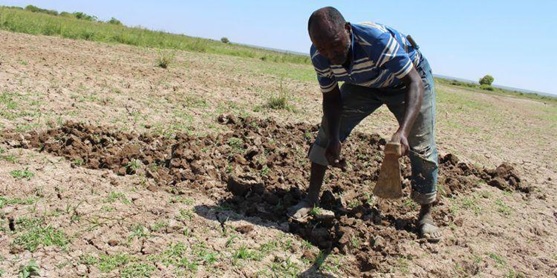(ERGO) – Abshiro Abdi Adan, 52, is glad to be home on their three-hectare farm in southern Somalia’s Dinsor district after three hard and unproductive years spent in one of the overcrowded camps for internally displaced people in Baidoa.
She and her husband harvested maize, sorghum, beans, tomatoes, spinach, peppers, and watermelon from the family farm in June. It was the first time since the drought set in that they have had enough to eat and food to spare.

“Now that I have returned to my village, thanks to God our farms have got rainfall, our situation and life has improved. We are now occupied with our farms,” she said.
They have put 15 bags of maize and beans in their food store, which they estimate will last them for the next four months. Abshiro has begun selling their excess produce to earn cash to take care of her nine children’s health, education, clothing, and other needs.
She has enrolled her children in Koranic school after the three year enforced break while they were living in Barodi IDP camp in Baidoa.
They left the farm and their village in a desperate situation in 2020, having suffered crop failure and losses and seen their 120 goats perish in the drought, hoping to get aid in the camp in town.
However, life was tough in the camp and they experienced poor shelter, lack of food, and malnutrition. They received $85 a month in cash aid from UN’s World Food Programme but this did not meet the needs of a large family.
“When we came to Baidoa, we suffered a lot because we didn’t get what we expected. We were suffering because we were displaced from our houses. We were faced with all kinds of hardships, everything got very tight, and it was hard even to cook once a day,” Abshiro said.
With the recent good harvest, she has managed to pay off the $800 debts they incurred at local stores while living in the camp using money from the sale of farm produce.
Abshiro’s family were among 700 farmers in Dinsor given seeds by the UN’s Food and Agriculture Organisation (FAO) in March as the rainy season started. This spurred their return to their farm, 11 kilometres west of Baidoa, on 12 March to plant.
They are among around 13,000 farming families displaced from parts of Bay and Bakool who have reaped their first harvests in three years after returning to the fields, according to the local farmers’ association.
On 20 June, Abdinur Mohamed Adan, who owns a four-hectare farm in Rabdhure in Bakool, started reaping some of the food and vegetables he has grown with the recent rainfall.
His family moved to an IDP camp in Hudur district at the height of the drought, where they lacked food and often resorted to begging. He is glad to have returned to the village.
“We feel a big difference, we have enough food and water. We also eat three times a day, we get everything from our farm and we don’t worry much now. Since we returned to Rabdhure, we can roast our beans and cook the other crops, so we don’t go hungry,” he said.
He had taken a $380 loan from local businessmen to invest in his farm and has paid off his debts already. He estimates that he could make $4,000 from sales of produce from this season’s harvest.
The chairman of the farmers’ association in Bay region, Abdinur Ibrahim Mohamed, said this was the first good harvest in Bay and Bakool since 2020. Farmers were now transporting their produce to all regions of Somalia.
He noted that farmers living in squalid displacement camps had been on the brink of starvation and famine.
“The people who lived in Bay and Bakool moved to the cities including Baidoa and the city became overwhelmed. The population has grown from 300,000 and reached 1,500,000 people. The people were suffering in the city, but now, thanks to God we have got the rainfall and seeds,” he explained.
The farmers’ cooperative will collect money from the better off families to support those families who were struggling. The association is advising all families to store food from the harvest to see them through future dry seasons and unpredictable weather.
Source: Ergo Radio


